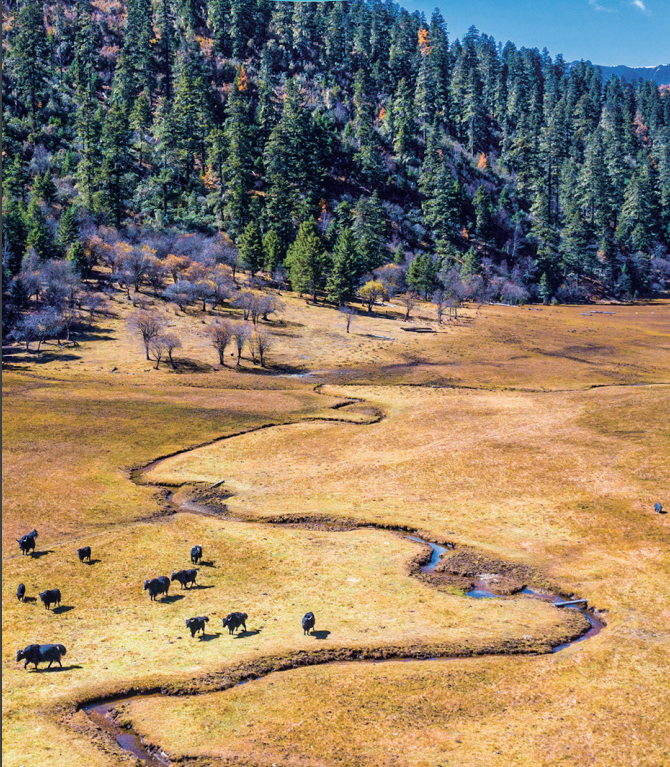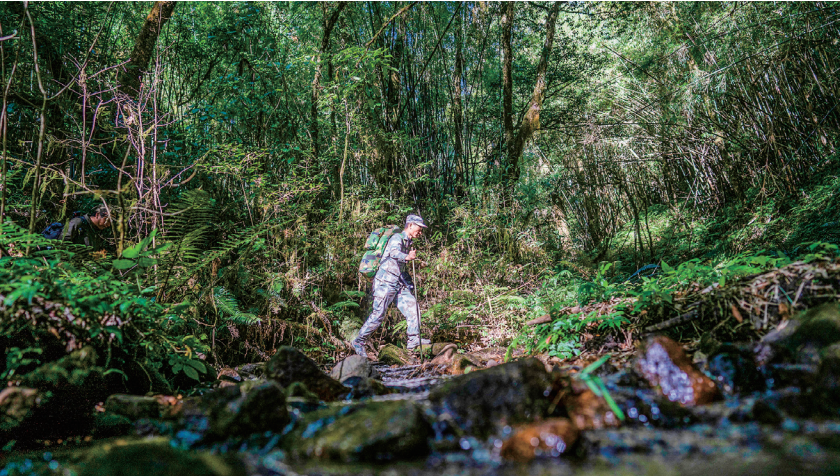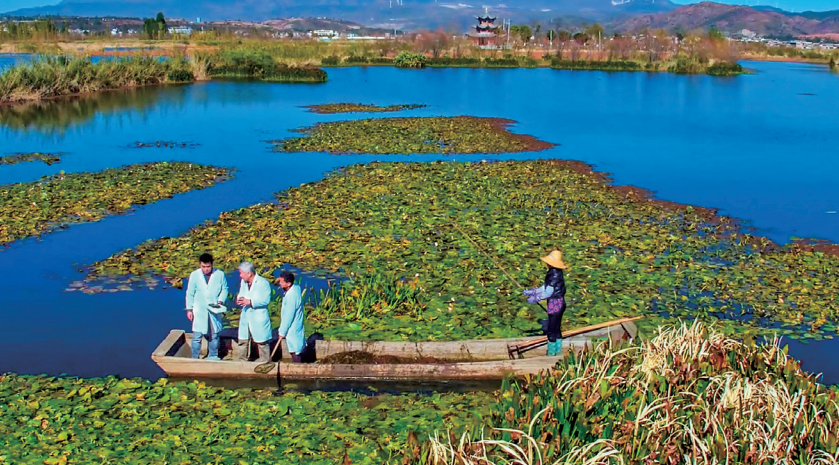Yunnan’s green effort pays off
Dubbed as “Kingdoms of animals and plants” and “World’s Gene Bank”, Yunnan is one of the most biologically diverse provinces in China and the southwest ecological shield for the country. In recent years, the province has been committed to green development, gaining exceptional achievements in protecting biodiversity and building ecological civilization.

Caring for common home
The thick forests along the three parallel rivers in northwest Yunnan is home to Yunnan sub-nosed monkeys, elves of the snow mountains. To protect the snub-nosed monkeys and other species, the Baima Snow Mountain nature reserve was established in the 1980s. For Zhong Tai, an engineer of the nature reserve, it was at the end of 1985 that he first encountered snub-nosed monkeys when he accompanied experts from Kunming Institute of Zoology, CAS on an field investigation in the wilderness. “The monkeys have human-like faces and big red lips. At that time, they had a small population size and lived in remote mountains, so it was very difficult to encounter them,” Zhong recalled.
At the foot of the Baima Mountain is the home of 69-year-old ranger Yu Jianhua. In his memory, people from surrounding villages earned their keep by haunting and logging in the past, which inflicted impacts on habitats of Yunnan sub-nosed monkeys, resulting in their population decline.
To save the endangered monkeys, the Baima Snow Mountain nature reserve has carried out strict protection measures and joined hands with local communities in seeking a balance between nature protection and local development, so as to promote the recovery of monkey population.
“Gradually, more and more villagers have got involved in the protection of nature, our common home,”Yu Jianhua said that now many monkey families live in the surrounding forests of villages. They are less afraid of humans and we can see them in a distance of less than 50 meters. According to data, the number of Yunnan sub-nosed monkeys has increased from less than 500 to 2,300 since the nature reserve was founded.
Yunnan is moving faster to establish a scientific and rational protected area systems, effectively protecting rare and endangered species and their habitats. According to Wang Weibin, deputy director-general of Yunnan provincial administration of forest and grassland, the province has established 362 protected areas of various types, which covers 90% of the important ecosystems and provides shelters for 85% of the protected wild animals and plants in the province.
Located in Kunming Botanical Garden, the Fuli Palace biodiversity experience park is an outdoor exhibition site of the COP15. It houses more than 2,500 species of featured plants, presenting Yunnan’s image as a “Kingdom of Plants”.
“Besides important and rare plants in China, there are also representative plants from other countries in the five continents exhibited in the biodiversity displaying park,” said Sun Weibang, director of Kunming Botanical Garden. He added that the park shows the rich biodiversity and unique garden landscapes of the world.

Guarding lucid water and lush mountains
In northwest Yunnan’s Shangri-la city, 63-year-old Rongbi lives in a village with an elevation of 3,500 meters. In the surrounding areas of the village, there are lakes, wetlands, forests, grassland, rivers and streams, and rare animals and plants. And the ecosystems are well preserved.
But in the past, there was a different story. Local villagers earned their livings by logging and haunting. Changes has taken place as the local government carried out community-supporting policy several years ago, which has benefited Rongbi and other villagers. “I receive an annual government subsidy of several ten thousand Yuan,” Rongbi said that the lucid water and lush mountains are indeed Invaluable assets.
From a farmer to a ranger, Rongbi’s story is an epitome of Yunnan’s efforts and achievement in protecting nature. People in the province are increasingly aware of the importance of ecological conservation. In recent five years, they planted more than 100 million trees voluntarily.
The Erhai lake is another example of Yunnan’s effort in protecting nature. In 2016, a battle was started to fight pollution in the basin of Lake Erhai. Up to now, the government of Dali City where the Lake Erhai is located, has invested 32.98 billion yuan into the protection of the lake. 1,860 households were relocated and 169.5 acres of land were returned to the lake. These actions has brought back cleaner water to Lake Erhai, hooking local people into the beautiful memories.

Conserving nature and ecology
Recently, all eyes were on a herd of elephants heading north and guided southward by humans to their traditional habitats. During their return trip, the herd were taken good care of by the Chinese government at different levels and the people. Their travel shows the vivid results of China’s endeavor to protect wild animals, and draws more people’s attention to biodiversity conservation.
“Holding the philosophy that man and nature need to coexist in harmony, Yunnan has enhanced biodiversity conservation and established a more complete protected area system. The ecosystem quality shows significant improvement in the whole province, ” said Ma Yongfu, director-general of Yunnan provincial department of ecology and environment.
Yunnan is the first among all Chinese provinces, municipalities and autonomous regions to roll out a local biodiversity conservation law——“Yunnan Provincial Rules and Regulations on Biodiversity Conservation”. It also adopted the provincial-level “Biodiversity Conservation Strategy and Action Plan (2012-2030)”. Under these local laws, wild Asian elephants, Yunnan snubnosed monkeys, Manglietiastrum sinicum and other precious and rare species have been well protected. The number of wild Asian elephants has increased from 150 to 300, the number of Yunnan snub-nosed monkeys has grown from 1,400 to 3,300, and that of western black crested gibbons has risen from 800 to 1,300, as introduced by Wang Tianxi, deputy director-general of Yunnan provincial department of ecology and environment
20 plant species with extremely small populations are put under effective protection through the in-situ, ex-situ and acclimation measures: Poncirus polyandra, which is extinct in the wild, has been reintroduced to their original habitats; 15 plant species under ex-situ protection such as Pinus squamata and Craigia yunnanensis has bloomed and born fruits.
“The province has rolled out local laws, made integrated efforts and utilized innovative ways to promote the protection of species with extremely small populations,” said Wang Weibin. In 2005, Yunnan launched an initiative to protect the species with extremely small populations. In 2010, the provincial government approved the implementation of the “Outlines of Yunnan Plans to Protect Species with Extremely Small Populations”. According to the outlines, 62 wild plants and 50 wild animals are put under priority protection. And during the “13th Five-Year Plan” period of the province, more than 120 protection projects had been implemented.
Yunnan also established protected areas for green peacocks and gaurs. In the mean time, it has established and improved monitoring systems on Asian elephants, Yunnan snub-nosed monkeys, green peacocks and other species with extremely small populations and their habitats. For example, to protect wild elephants, said Wang Weibin, Yunnan has carried out projects on habitat restoration, monitoring, warning and security, and established “elephant canteens” covering 1,482.6 acres.
Trans-editing by Zu Hongbing